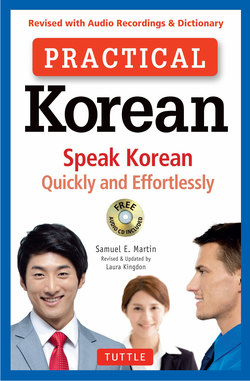Читать книгу Practical Korean - Samuel E. Martin - Страница 20
На сайте Литреса книга снята с продажи.
ОглавлениеLESSON 13
More Particles
Here are some one-shape particles, with examples after both consonants and vowels:
| PARTICLE | MEANINGS | EXAMPLES |
| ui (PRO-NOUNCED e) | modification or | Gim-ssi-chaek ieyo. 김씨의 책이에요 |
| subordination | It’s Mr. Kim’s book. | |
| Nugu-ui moja eyo? | ||
| 누구의 모자에요? | ||
| Whose hat is it? | ||
| e | (1) direction to | Geu-neun hakgyo-e gamnida. |
| 그는 학교에 갑니다 | ||
| He goes to school. | ||
| Geu-neun eun(h)aeng-e gamnida. | ||
| 그는 은행에 갑니다. | ||
| He goes to the bank. | ||
| (2) location at, in | Geu-neun hakgyo-e isseoyo. | |
| 그는 학교에 있어요. | ||
| He is in school. | ||
| Geu-neun eun(h)aeng-e isseoyo. | ||
| 그는 은행에 있어요. | ||
| He’s at the bank. | ||
| (3) a point in | Han si-e ol geyo. | |
| time at, in | 한 시에 올게요. | |
| I’m coming at one o’clock. | ||
| Ojeon-e ol geyo. | ||
| 오전에 올게요. | ||
| I’m coming in the morning. | ||
| (4) impersonal | Geu reul eun(h)aeng-e bonael | |
| indirect object | geoeyo. | |
| 그를 은행에 보낼게요. | ||
| I’m sending (him, it) to the bank. | ||
| Hoesa-e emeileul sseugo isseoyo. | ||
| 회사에 이메일을 쓰고 있어요. | ||
| I’m writing an email to the company. | ||
| hante | personal | Pumonim-gge bonael geoeyo. |
| indirect object | 부모님께 보낼꺼에요. | |
| to, at, for | I’m sending it to (my) parents. | |
| (a person) | Chingu-hante emeileul sseugo | |
| isseoyo. | ||
| 친구한테 이메일을 쓰고 있어요. | ||
| I’m writing an email to the company. | ||
| ege | SAME; less | Biseo-ege jul geyo. |
| colloquial | 비서에게 줄게요. | |
| I’m giving it to the secretary. | ||
| bogo | SAME; more | Nugu-bogo mal hae yo? |
| colloquial | 누구보고 말해요? | |
| Who are you telling (to)? | ||
| Gim-ssi-bogo iri ora haseyo. | ||
| 김씨-보고 이리 오라 하세요. | ||
| Tell Mr. Kim to come here. |
| PARTICLE | MEANINGS | EXAMPLES | |
| seo, eseo | (1) dynamic | Hakkyo-eseo yeongeo-reul | |
| location | baewosseoyo. | ||
| (happens) at, in | 학교에서 영어 배웠어요. | ||
| I learned English at school. | |||
| Seoul-eseo taeeonasseoyo. | |||
| 서울에서 태어났어요. | |||
| I was born in Seoul. | |||
| (2) from (a place) | Yeogi-seo meoreoyo. | ||
| 여기서 멀어요. | |||
| It’s far from here. | |||
| Ucheguk-eseo oreunjjok-euro | |||
| doragaseyo. | |||
| 우체국에서 오른쪽으로 돌아 | |||
| 가세요. | |||
| From the post office, turn to the right. | |||
| egeseo | from (a person) | Nugu-e ke seo deureosseoyo. | |
| 누구에게서 들었어요. | |||
| I heard it from someone. | |||
| buteo | from (a time | Yeogi-buteo sijak hapsida. | |
| or place) | 여기부터 시작합시다. | ||
| Let’s start from here. | |||
| Achim-buteo bam-kkaji ilman hamnida. | |||
| 아침부터 밤까지 일합니다. | |||
| I work from morning till night. | |||
| kkaji | (all the way up) to | Han si-kkaji oseyo. | |
| (a place or time) | 한 시까지 오세요. | ||
| Come by 1 o’clock. | |||
| Yeogi-kkaji hapsida. | |||
| 여기까지 합시다. | |||
| Let’s stop here. | |||
| hago | with, and (MORE | Chaek-hago yeonpil kkeonaeseyo. | |
| COLLOQUIAL THAN | 책하고 연필 꺼내세요. | ||
| wa/gwa) | Take out a book and a pencil. | ||
| Chingu-hago gayo. | |||
| 친구하고 가요. | |||
| I’m going (together) with a friend. | |||
| man | just, only | Yeonpil-man isseoyo. | |
| 연필만 있어요. | |||
| I’ve only got a pencil. | |||
| Chingu-man mannayo. | |||
| 친구만 만나요. | |||
| I’m only seeing my friend. | |||
| gachi | like | Agi-gachi malhaeyo. | |
| 아기 같이 말해요. | |||
| He speaks like a baby. | |||
| Nabi-kachi chumchwoyo. | |||
| 나비같이 춤춰요 | |||
| She dances like a butterfly. | |||
| bak-ke | outside of, except | Jip-bak-e eopseoyo. | |
| (or | for, aside from, | 집 밖에 없어요. | |
| bakke) | or (anything) but | I haven’t but my house. = I have | |
| only my house. | |||
| (Jip-man iseoyo. 집만 있어요.) | |||
| Gim moksa-bakke amudo | |||
| an wasseoyo. | |||
| 김목사 밖에 아무도 안 왔어요. | |||
| (They) didn’t come but Rev. Kim = | |||
| Only Rev. Kim came. | |||
| (Kim moksa-man wasseoyo. | |||
| 김목사 만 왔어요.) |
